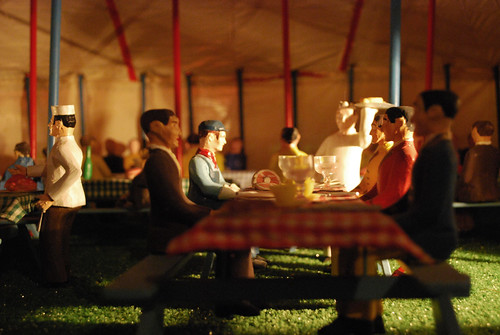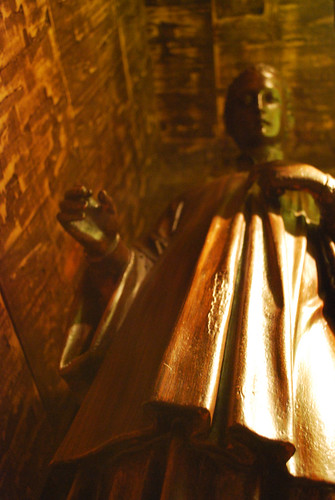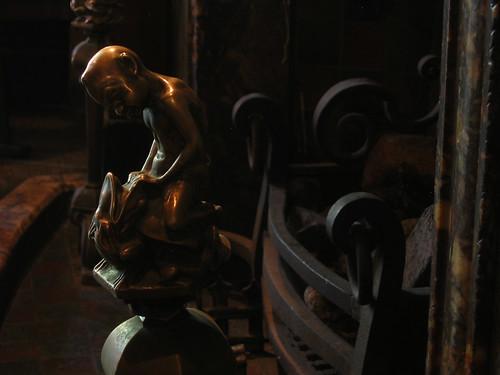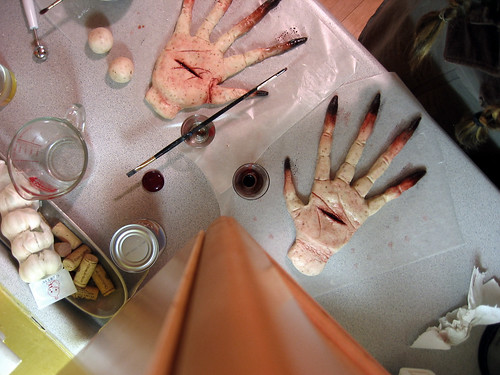We close the book wrung out, strained, confused. And what are we left with? What, after all, is this novel? On the one hand it is, as I’ve described above, an investigation of violence, and specifically of male violence, bound up as it often is with another primal force, sex; it is about the hiding places we offer for savagery within our societies and ourselves, the veneer of civilization that only hides the horror because we are complicit in its deceit. And, like The Savage Detectives, it is about the tenuousness of human life—about how the only thing we can be sure of is that all those we love will some day disappear, and whether it’s into the wider world or into the void we may never even learn.How could this giant, deliberately shaggy mess of a book possibly be staged? That was the question Robert Falls and Seth Bockley took upon themselves when the Goodman Theatre committed to making the attempt, and the result, playing now, is, if imperfect, nonetheless an astonishing piece of theater, one that does honor to the book and to the essence of Bolaño's bleak, horror-filled, yet powerfully vibrant vision. The staging is inventive, the performances remarkable, and the whole an unforgettable night of theater.
To squeeze 900 pages into even the five-and-a-half hours the play runs of course requires pruning and alteration, and much is lost. Some of the losses are simply a result of the shift in form: the most compelling of the novel's five books, "The Part About Amalfitano," which offers an excruciating close look at the mind of an academic and father who is slowly losing his sanity—and fighting tenaciously to hold onto it long enough to get his reckless teenage daughter to safety away from the violence of their hometown of Santa Teresa—can only be approximated onstage. Even remarkable performances by Henry Godinez as Amalfitano and Alejandra Escalante as his daughter can't overcome the fact that in shifting from prose to stage necessarily costs their story a level of intimacy and access.
Other losses are understandable, if nonetheless painful. The greatest of those for me was the removal of the more cryptic, hermetic aspect of Bolaño's story. The novel is full of references—to nightmares, shipwrecks, deserts, and, especially, to the unexplained mystical year of 2666 toward which all things seem in some vague way to be tending, perhaps catastrophically—that tie it in overt and oblique ways to the rest of Bolaño's oeuvre, and give the violence that suffuses the book a near-mythological, fatalistic tinge. Though the staging does a remarkable job of replicating that atmosphere of inescapable doom, I missed the more mystical element, such a fundamental part of Bolaño's obscure cosmography.
At the same time, the staging of the novel improves it in unexpected ways. The most straightforward comes with the third book, "The Part about Fate." It's the least successful in the novel, primarily, I suspect, because it deals with two things—crime fiction and African American culture—that are in themselves incredibly potent and distinctive, and Bolaño seems less sure-footed with both than he is, say, with tales of Mexican bohemians or the tropes of horror. But on stage, that book comes to life, told through a mix of film footage (some of it flat-out frightening) and live action. Whereas African American reporter-turned-unexpected-detective Oscar Fate never quite convinces on the page, when we see him portrayed on stage by Eric Lynch, we buy him completely. And from there, we begin to buy the framework of his obsessive, wayward investigation.
More impressive than that, however, was the way that the compression of the story for the stage—the fact that it's experienced in less than six hours rather than in the week or more of reading the novel—enabled me to see linkages and themes and recurrences that had previously passed me by. I thought I knew the novel well, but as I watched the play, I felt that, perhaps for the first time, I was beginning to understand how Bolaño intended the pieces to fit together, how he meant for his ideas to ripple through the whole, reflecting and amplifying one another as the contexts changed. And it was an effect that was enhanced by the standard theater technique of having actors double roles. Seeing the same face and body in a wholly different situation, acting and talking differently but confronting remarkably similar problems of human violence and death, in scene after scene had a powerful effect.
I can't imagine going into the show having not read the book. But for someone who has, and to whom Bolaño's work speaks, I can't imagine missing it. I came out of it, well, like I came out of the novel: wrung out, strained, confused. But also exhilarated, and incredibly glad people had been willing to take a dare this big, and that I'd been there to watch it.












